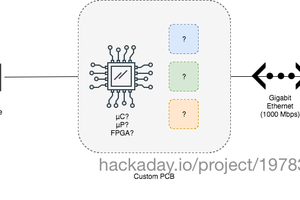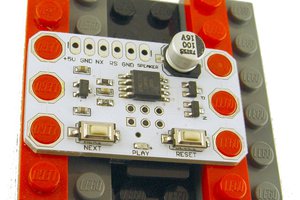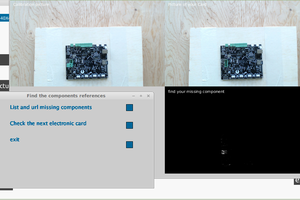I have basic functionality. I can connect my development board to a normal card adapter and access it as a normal SD card. Next I should be making the PCB and case.
I don't have a prototype yet. My plan is to use a Xilinx Artix FPGA and a DRAM. Why not a cheaper FPGA? Because I want it to eventually support SD Express (PCIe 3 with 1GB/s of throughput) without consuming too much power. The maximum power of a removable SD card is 1.80W (data from SD simplified spec v6.00, might change in v7.0). This adapter should take a fraction of that.
A DRAM stores the grain mapping. Encryption and decryption of the disk image is done in hardware. A soft CPU is also used for things like initialization and updating image metadata. I'm currently using the Microblaze, but I don't mind switching.
Since I don't have a PCB yet, I am testing my code on a Digilent Arty S7-50. The connection is straightforward. My connection is configured in the file adapter/adapter.srcs/constrs_1/new/sd_host_if.xdc. You'll probably want to change it. sd_host_if_dat, sd_host_if_cmd, and sd_host_if_clk connect to the corresponding pins of an USB SD card reader. sd_host_if_dat3_pullup is connected to CD/DAT3 through a 47KOhm resistor.
Some of the challenges to me:
I need a name for this project.
I don't have the latest SD full specification. But the simplified specification is badly written besides having some parts omitted. This problem is partly mitigated with the MMC specification.
I have to figure out how to fit everything in 2.1mm by 32mm by 24mm. It includes an FPGA, a DRAM, the voltage regulator, and a micro SD card socket.
The adapter should present to the host a formatted disk. We should also allow it to present to the host a disk of size as big as the space left on the micro SD card. This means the initial image contents would be different depending on how much space is left. We plan to solve this by saving templates at different locations when initializing the storage.
I need a way to generate random keys. The ADC seems to be a good random source. It provides 16 bit results, but only 12 bits of accuracy is guaranteed. I tried reading the internal temperature sensor at about 1 MSPS for about 6M samples. I then tested randomness of each of the 16 bits by extracting that bit from each sample and feeding them to rngtest. Bit 2 to 5 (corresponding to 0.031℃ up to 0.25℃) passed the FIPS test. I will also use an EEPROM that's updated every power cycle just to be safe.
Parts I have:
The storage format. Some parts are still to be figured out. And my writing may be bad.
A mostly working AXI lite bus SD device interface. It supports generating responses in hardware. But it only supports the SD bus. We also need SPI and UHS-II interfaces and possibly NVMe in the future.
XTS-AES hardware implementation. It supports configuring how many hardware AES stages are used in order to balance real estate and speed. It can process 16 bytes per clock cycle in the fastest configuration.
The storage format: https://github.com/eywdck2l/cvtm-format


 Antti Lukats
Antti Lukats
 Sri
Sri
 bobricius
bobricius
 Christopher Sainsaulieu
Christopher Sainsaulieu
Good day,
It seems that Swissbit has commercialised a custom SD card with an embedded 'secure element' which manages encrypted access to the storage space on the card. The price for an 8GB SD card is $46 at https://www.sparkfun.com/products/16899
The product has some limitations, since its assumed that the owner has full access to all the security keys. This will give the owner access to the partition with the OS and applications.
I would like to sell a product where the key management is split. The factory lock the partition of the main OS&app and the user manages the user data partition with the key that they configure. A new user key can be programmed, which will result in the user partition being encrypted by the new key, leaving the main OS & application partition unaltered. The user will be able to interact with the application via a UART but not have access to the OS or application binary (executable) itself.
Can you please provide me with an approx. hardware price when using a FPGA + regular SD card, as used in your project?